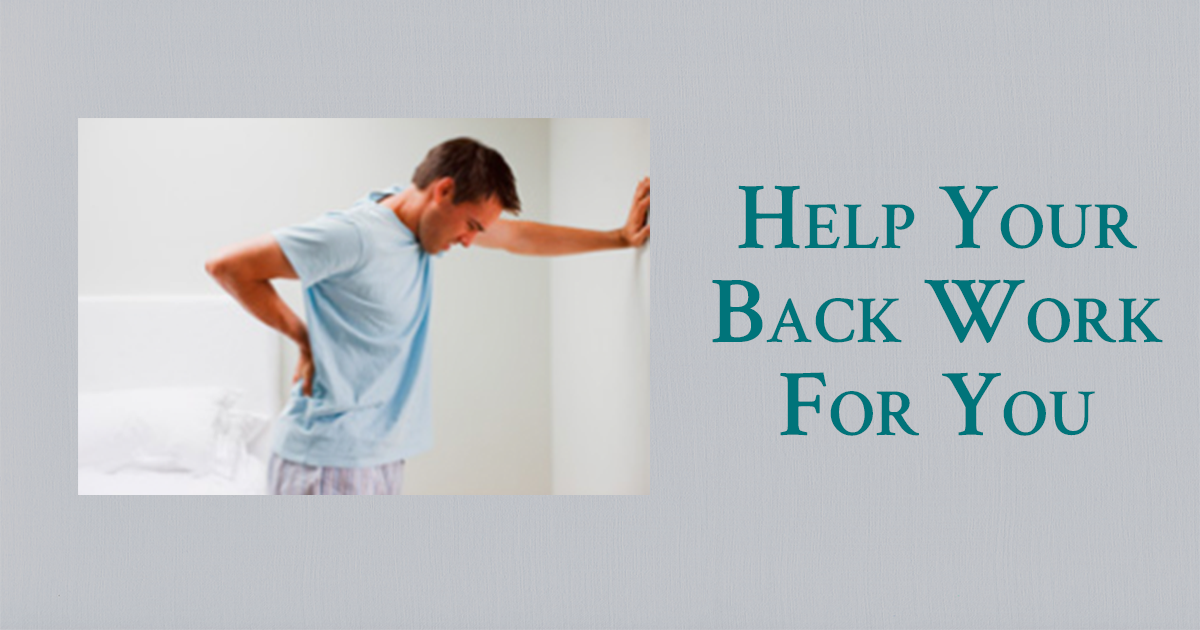Help Your Back Work For You

Your back is important to almost every move you make, but you probably won’t realize that until you hurt it. Then you may wish you could return to the days when you took your back for granted and didn’t have any pain. Even though you can’t turn back time, you can recover from most back injuries. You can also learn how to protect your back so you’ll keep moving and stay comfortable in the future.
For people younger than 45, back pain is the most common cause of disability. A variety of factors can bring on this pain, says the National Institute of Neurological Disorders and Stroke (NINDS). Poor muscle tone and being overweight strain your back. Improper twisting or lifting can send your back into spasms. Aging can make your back more at risk for injury. And sometimes, back pain happens for no known obvious reason.
Strong abdominal and back muscles can reduce your risk for injury. You can strengthen your back muscles by getting regular exercise.
At home
Simple home remedies can relieve most back pain. It will take some patience, but if you care for your back correctly, you should feel better within 6 weeks after the injury.
Rest in bed as little as possible—a few days at most, says the NINDS. Too much bed rest weakens your muscles and could slow your recovery. Get up and move around as soon as you can.
For the first 2 days, use ice or cold compresses. It may help to ease your back pain. Wrap a towel around a bag of ice and place it against the painful area for up to 20 minutes. You can also use a bag of frozen vegetables. This will change to fit the shape of your body. If you still have pain after 2 days, soothe your muscles with heat. Try a heating pad on its lowest setting, take a warm shower, or soak in a warm bath.
Over-the-counter pain relievers and anti-inflammatory medicines may also help. Either of these can reduce muscle and joint inflammation and relieve pain. Talk with your healthcare provider about the right medicine for you.
When to call your healthcare provider
Your back pain may require medical attention. Call your healthcare provider if any of these statements apply:
- Your back pain started after you fell or were struck.
- You feel weakness, numbness, or tingling in your legs.
- You have bladder or bowel problems.
- Your pain is getting worse or doesn’t go away after a few weeks of home care.
Your healthcare provider will probably ask you when the pain started. It will help if you can tell your healthcare provider what makes the pain worse and what makes it better, like a specific activity, motion, or treatment.
Make it strong
Even if you’ve had back trouble, you can have a strong back. If you take care of your back, it’s more likely to carry you through the day with few complaints. Here are some guidelines for strengthening this important part of your body:
- Maintain good posture. Don’t slouch when standing or sitting. When standing, keep your weight balanced on your feet.
- Sit in a chair that supports your lower back. If you don’t have a supportive chair, place a small pillow or rolled-up towel against the curve in your lower back.
- Exercise. Strong back muscles can reduce your risk for injury. Strong arms, legs, and belly muscles can reduce the work your back has to do. Low-impact aerobic exercise, like walking or stationary biking, increases the flow of blood and oxygen to your back muscles. Choose your exercises carefully. For example, running may not be good for a weak back. Swimming and water aerobics support your back while you exercise. Walking is also a good choice. If you’ve had a serious back injury, you should talk with your healthcare provider before you start exercising regularly.
- Maintain a healthy weight. This will lessen the strain on your back. Your healthcare provider can tell you if you need to lose weight.
- Learn how to lift properly. When you bend to pick something up—even a child—bend at your knees and keep your back straight. You may have to squat or kneel. This puts the stress on your legs. They are stronger than your back. When you pick up an object and carry it, hold it close to your body. The farther it is from the middle of your body, the more it strains your back.
- Pay attention to pain or twinges. If you feel back pain during an activity, stop and rest. Your body may be trying to prevent you from harming your back.
Online Medical Reviewer: Joseph, Thomas N., MD
Online Medical Reviewer: Sather, Rita, RN
Date Last Reviewed: 1/1/2018
© 2000-2018 The StayWell Company, LLC. 800 Township Line Road, Yardley, PA 19067. All rights reserved. This information is not intended as a substitute for professional medical care. Always follow your healthcare professional’s instructions
